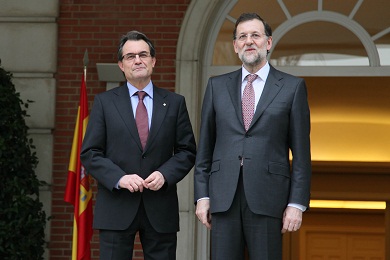
Is that a bewildering independence declaration which I see before me?
Hearing Catalonia’s regional president Artur Mas (who praised London’s attitude against the challenge of a Scottish referendum) when he answered to correspondents in Madrid on Thursday afternoon, it appeared that Brussels was about to land one very hot ball.
After his meeting with Spain’s president Mariano Rajoy, Mas said: “we had always believed that there could have been a chance for Catalonia to develop within the Spanish Constitution framework.” In Spain, the government was “making a huge mistake today,” he explained, by refusing a new fiscal pact with Catalonia.
Now that Europeans need the United States of Europe to salvage the common currency area and their economies, the Catalan leader also uttered, Catalonia would seek its place whether keeping up its Spanish membership or not.
Artur Mas delivered an at times unnerving combination of smug identity vindications and vague threats.
But listen to the Catalan regional minister for the Economy, Andreu Mas-Colell, and you get a much more temperate, fine picture.
For instance, Mas-Colell has publicly admitted that the Catalan government would submit itself to all additional conditions that Brussels could impose on to Spain to activate a rescue.
Catalonia requires a €5 billion cash injection to repay debts and tame its budget deficit, both to which it is legally bound. But in Barcelona no one knows yet how the regional bailout will work, the loan instalment schedule or even its interest rate.
The Generalitat (the original name of the Catalan government) will face liquidity urges as early as October, Mas-Colell has acknowledged, though no word on the set up of the Liquidity Fund for Regions has arrived from Madrid. Will the fund become a senior lender over the banks that have already open credit lines to some regions? Will the fund’s initial €18 billion capital be enough?
Spain recorded a net fiscal transfer from Catalonia of more than €16 billion in 2009, with a scathing crisis having run for two entire years. It wasn’t anything new. There is little doubt about the engine-like role of the region for the rest of the country.
Over a million Catalans recently demonstrated in Barcelona demanding a new state. They did not go out to the streets only because of economic pressures, but discussing identity matters and cultural relations under the current financial stress will turn into a messy affair.
The Catalan national debate is a never-ending one, as it should be. On the contrary, Catalonia’s economic irritation can get easily readdressed. The region needs space to breath, to recharge its industrial batteries and fight back against recession.
If Madrid let it, Spain’s hopes of growth would rest on stronger foundations and Brussels would reward it.





OMG! The tax balance is 0.4 percent of the Catalan GDP, not 8.4 percent. The Generalitat’s assumptions are as credible as the Tea Party’s.
Because calculations over regional fiscal deficits vary, I preferred to use the less disputed figure of Catalonia’s net contribution -in which central government investment in the region is added, it should be clarified. It shows the Catalan economy has some muscle, whatever the political assumptions.
I’ve never seen so original arguments to defend an indefensible position. The gamble of Mas doesn’t represent a majority. Economically is a disaster. Polítically is a huge irresponsability. The consequences could be a desaster of historical significance. It could become definitevly the ruin of Spain and Cataluña. Don’t worry. Sadly, the iniciative is for Mas and it is unstopable.